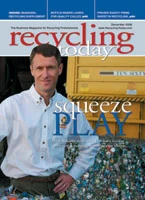RECYCLING COALITION CALLS FOR MORATORIUM ON PLA BOTTLES
A group of recycling organizations is calling for NatureWorks to halt expansion of its bio-based polylactic acid (PLA) in beverage bottles until the bio-resin’s recyclability has been demonstrated.
Members of the group seeking the moratorium include Eco-Cycle, Eureka Recycling, Ecology Center, The Plastic Redesign Project, Institute for Local Self-Reliance, Center for a Competitive Waste Industry and GrassRoots Recycling Network.
NatureWorks, a subsidiary of Cargill, has commercialized a plastic resin made from corn. The company claims PLA has preferable end-of-life advantages because it is compostable as well as recyclable and convertible back into PLA.
The coalition emphasized its support for bio-based resins for compostable food serviceware, but it questioned the economic viability of recycling or composting PLA bottles and raised concerns about large numbers of PLA bottles harming the economics of PET bottle recycling.
RECYCLING IS BIPARTISAN
While there was plenty of trash-talking leading up to this year’s mid-term elections, a study commissioned by the Aluminum Can Council’s Curbside Value Partnership (CVP) shows that Democrats and Republicans agree on curbside recycling.
A recent national survey conducted by the Opinion Research Corporation shows that most Democrats and Republicans are doing their parts to recycle at the curb. In fact, in areas where curbside recycling is available, 70 percent of Democrats and 69 percent of Republicans say they "always" participate.
The survey also found that:
• When asked how important curbside recycling was to them, Democrats (95 percent) and Republicans (94 percent) answered that it was at least "somewhat important to them," if not "very" or "extremely important."
• Only 2 percent of each party stated that recycling is "not at all important."
• More than half of respondents in both parties believe recycling is their responsibility in order to help the environment.
• Both parties focus highly on recycling newspapers and aluminum cans.
• Democrats are more careful to recycle glass (18 percent) than Republicans (10 percent), and Republicans are more careful to recycle plastic (24 percent) than Democrats (16 percent).
Full survey results are available at www.RecycleCurbside.org.
ISRI TAKES A BITE OUT OF CRIME
With secondary metals netting record prices in the last year, theft has become a prominent issue for metals recyclers as well as for law enforcement agencies.
In an attempt to address the issue of scrap metal theft, the Institute of Scrap Recycling Industries Inc. (ISRI) Scrap Theft Task Force has released a document titled "Recommended Practices and Procedures for Minimizing the Risks of Purchasing Stolen Scrap Materials" that has recently approved by the ISRI board.
ISRI says its recommendations enhance the steps its members have already taken to reduce scrap metal theft and encourages scrap dealers to adopt the practices that are most appropriate for their facilities.
The recommendations include:
• Building working relationships with local law enforcement;
• Requiring identification from the seller;
• Paying by check or ATM or using tracking methods for cash transactions;
• Capturing transactions on video surveillance;
• Prohibiting certain items, such as clearly identifiable new production materials or items only used by governments and utility companies, unless they are accompanied by proper authorizations; and
• Training employees to identify suspicious materials.
The recommended practices are available on ISRI’s Web site at www.isri.org/TheftPractices.

Explore the December 2006 Issue
Check out more from this issue and find your next story to read.
Latest from Recycling Today
- Nextek, Coveris to recycle food-grade plastic film
- Recyclekaro expands recycling capacity
- USTR hears comments on port fee proposal
- C&D World 2025 hits record attendance and exhibitor numbers
- Denali now offers mobile depackaging service
- Hyundai confirms Louisiana as EAF mill site
- ASCE sees infrastructure progress, but more to be done
- Global steel output tapers downward





